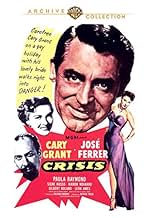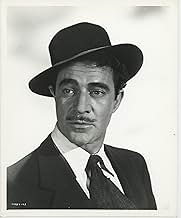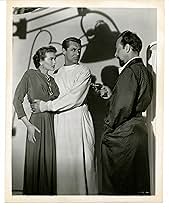De vacaciones en un país latinoamericano, un neurocirujano estadounidense y su esposa se ven envueltos en un levantamiento revolucionario contra un dictador tiránicoDe vacaciones en un país latinoamericano, un neurocirujano estadounidense y su esposa se ven envueltos en un levantamiento revolucionario contra un dictador tiránicoDe vacaciones en un país latinoamericano, un neurocirujano estadounidense y su esposa se ven envueltos en un levantamiento revolucionario contra un dictador tiránico
- Dirección
- Guionistas
- Elenco
- Premios
- 1 premio ganado en total
José Ferrer
- Raoul Farrago
- (as Jose Ferrer)
Lillian Adams
- Nurse
- (sin créditos)
Carlos Barbe
- Friend of Farrago
- (sin créditos)
Orlando Beltran
- Doctor's Assistant
- (sin créditos)
Audrey Betz
- Servant
- (sin créditos)
George Brady
- Student
- (sin créditos)
Robert Cabal
- Very Young Man
- (sin créditos)
Andy Carillo
- Man at Table
- (sin créditos)
Bridget Carr
- Guest
- (sin créditos)
Teresa Celli
- Rosa Aldana
- (sin créditos)
Carlos Conde
- Man
- (sin créditos)
Rita Conde
- Pretty Woman
- (sin créditos)
- Dirección
- Guionistas
- Todo el elenco y el equipo
- Producción, taquilla y más en IMDbPro
Opiniones destacadas
Fans of Cary Grant should see this under appreciated film. It proves that Grant could indeed act - and that he has far greater range than his standard light comedy fare would indicate.
This is not a great movie, but it is a very well made movie. It has high production values. The film features three of the major "Latin Lovers" from the Silent era - Gilbert Roland, Ramon Novarro, and Pedro De Cordoba.
Jose Ferrer and Signe Hasso play a Latin American Dictator and his wife. They are the weakest points in the production - Ferrer insists on "Acting" through every scene. His performance comes across as very dated and unbelievable. Hasso, normally a fine actress, comes across as wooden and barely lifelike.
The weakest point in the production is the script. It insists on being very "politcal" and this detracts from the enjoyment value. Yet, because of this political viewpoint, it treats Latinos with much more respect and consideration than other movies filmed during this era.
This is not a great movie, but it is a very well made movie. It has high production values. The film features three of the major "Latin Lovers" from the Silent era - Gilbert Roland, Ramon Novarro, and Pedro De Cordoba.
Jose Ferrer and Signe Hasso play a Latin American Dictator and his wife. They are the weakest points in the production - Ferrer insists on "Acting" through every scene. His performance comes across as very dated and unbelievable. Hasso, normally a fine actress, comes across as wooden and barely lifelike.
The weakest point in the production is the script. It insists on being very "politcal" and this detracts from the enjoyment value. Yet, because of this political viewpoint, it treats Latinos with much more respect and consideration than other movies filmed during this era.
Cary Grant stars as a famous neurosurgeon who is vacationing in a South American country with his new bride. The pair are subject to a "friendly abduction" when the current president of that country, Raoul Farrago (Jose Ferrer), learns of his presence. You see, the president has a brain tumor, and due to the fact that his country is on the verge of civil war, he dares not travel to another country for the operation he needs to save his life.
Farrago is a tyrant who claims that he must be so because democracy would never work in his country. His people are illiterate children, he says, and wouldn't know what to do with freedom if they had it. However, being a national "father image" doesn't prevent the president from stealing everything in the country that isn't nailed down. The president's wife does a great job of emulating Evita Peron before much was really known about her. Then there is Gilbert Roland as the leader of the opposition. He wants to make his people free, as long as he gets to be the new dictator. Roland does a great job with this role. How far he has progressed here since his early days as an actor at the dawn of sound.
So the question is - does Grant owe a service to the dictator by saving his life with a delicate operation only so that patient can go on being a killer and a thief, or would the death of this tyrant better serve mankind? If you throw the safety of his wife into the balance - what decision does the doctor make?
Farrago is a tyrant who claims that he must be so because democracy would never work in his country. His people are illiterate children, he says, and wouldn't know what to do with freedom if they had it. However, being a national "father image" doesn't prevent the president from stealing everything in the country that isn't nailed down. The president's wife does a great job of emulating Evita Peron before much was really known about her. Then there is Gilbert Roland as the leader of the opposition. He wants to make his people free, as long as he gets to be the new dictator. Roland does a great job with this role. How far he has progressed here since his early days as an actor at the dawn of sound.
So the question is - does Grant owe a service to the dictator by saving his life with a delicate operation only so that patient can go on being a killer and a thief, or would the death of this tyrant better serve mankind? If you throw the safety of his wife into the balance - what decision does the doctor make?
I first saw this movie in 1950 when it was released. I thought it was a good drama, more or less accurately portraying many of the problems of Latin American governments, with good dialog particularly between the two male leads. Incidentally, I did not find either character particularly sympathetic, but no matter. Many of the comments here have mentioned the resemblance to Eva Peron of the Signe Hasso character. Just an interesting observation: In the much later made for TV movie, Evita Peron, Signe Hasso and Jose Ferrer both had roles. He was the tango singer who seduced Evita and took her to Buenos Aires. She was the aging actress who befriended the young Dva Duarte and found herself in a jail cell. Of the two movies, Crisis is by far the better film. Evita Peron was a ripoff.
Even someone who's been keeping track of old movies for many years can be forgiven if this one slipped under the radar. Surgeon Cary Grant and his wife are vacationing in a South- or Central-American paradise when they are abducted by government forces. Seems the country's dictator (Jose Ferrar) has a brain tumor but is afraid to leave the country due to revolutionary activity. Grant is pressured into performing the operation. Only problem is, the guerrillas have captured his wife, threatening to kill her if Ferrar survives the operation. But the letter informing him of this never reaches Grant.... Supporting cast includes Leon Ames, Ramon Navarro (Ben-Hur of the silent era) and Signe Hasso as Ferrar's wife, an Evita Peron clone. This is a tense and often intelligent drama (and slightly out of Grant's usual debonair range) that doesn't merit the obscurity it seems to be buried in.
Crisis represents yet another attempt by Cary Grant to break away from his light leading man image and do something with more drama. His last attempt was None But the Lonely Heart which got great critical notices, an Oscar nomination for him and died at the box office. The public just didn't want to see him in stuff like Crisis.
The film is one of a very few non-musical productions by Arthur Freed at MGM. And the original story was intended for Spencer Tracy who was to be a neurosurgeon traveling in Latin America with a 10 year old daughter. The powers that be decided a little romance was needed so Tracy was substituted by Grant and he was given a wife played by Paula Raymond instead of a daughter.
He's a neurosurgeon and when the powers that be discover him in their country he's brought to the presidential palace to operate on Peron like dictator Jose Ferrer. Then the rebels capture Paula Raymond and Grant's got a dilemma.
Signe Hasso who was cast in the role of the first lady bears more than a passing resemblance to Eva Peron does the best job in the film. Cast in Latino parts are such Hollywood Latinos as Raymond Novarro, Gilbert Roland, Antonio Moreno, and Pedro deCordoba. All perform well.
Crisis marked Richard Brooks's directorial debut and he wrote the script as well. Unfortunately the same thing happened here as did to None But the Lonely Heart. Great reviews and it lost money. Brooks was established as a director though.
The film is one of a very few non-musical productions by Arthur Freed at MGM. And the original story was intended for Spencer Tracy who was to be a neurosurgeon traveling in Latin America with a 10 year old daughter. The powers that be decided a little romance was needed so Tracy was substituted by Grant and he was given a wife played by Paula Raymond instead of a daughter.
He's a neurosurgeon and when the powers that be discover him in their country he's brought to the presidential palace to operate on Peron like dictator Jose Ferrer. Then the rebels capture Paula Raymond and Grant's got a dilemma.
Signe Hasso who was cast in the role of the first lady bears more than a passing resemblance to Eva Peron does the best job in the film. Cast in Latino parts are such Hollywood Latinos as Raymond Novarro, Gilbert Roland, Antonio Moreno, and Pedro deCordoba. All perform well.
Crisis marked Richard Brooks's directorial debut and he wrote the script as well. Unfortunately the same thing happened here as did to None But the Lonely Heart. Great reviews and it lost money. Brooks was established as a director though.
¿Sabías que…?
- TriviaOriginally banned in Mexico, Central and South America.
- ErroresThe doctor announces his fee is ten percent of the patient's income, but does not say whether this means monthly, annual or some other period.
- Citas
Raoul Farrago: At least permit me to thank you. You have done a great service not only to me but to the people of my country.
Dr. Eugene Norland Ferguson: I only saved your life I didn't vote for you.
Raoul Farrago: Neither did they.
[smiling]
- Créditos curiososPROLOGUE: "The time is now. The scene of the action is fictitious, but the forces at play in this story are not fictitious."
- Versiones alternativasAlso available in a computer colorized version.
- ConexionesReferenced in Secret Publicity - Forbes Taylor Remembers the Making of State Secret (2021)
Selecciones populares
Inicia sesión para calificar y agrega a la lista de videos para obtener recomendaciones personalizadas
- How long is Crisis?Con tecnología de Alexa
Detalles
Taquilla
- Presupuesto
- USD 1,616,455 (estimado)
- Tiempo de ejecución1 hora 35 minutos
- Color
- Relación de aspecto
- 1.37 : 1
Contribuir a esta página
Sugiere una edición o agrega el contenido que falta

Principales brechas de datos
By what name was Crisis (1950) officially released in India in English?
Responda
































